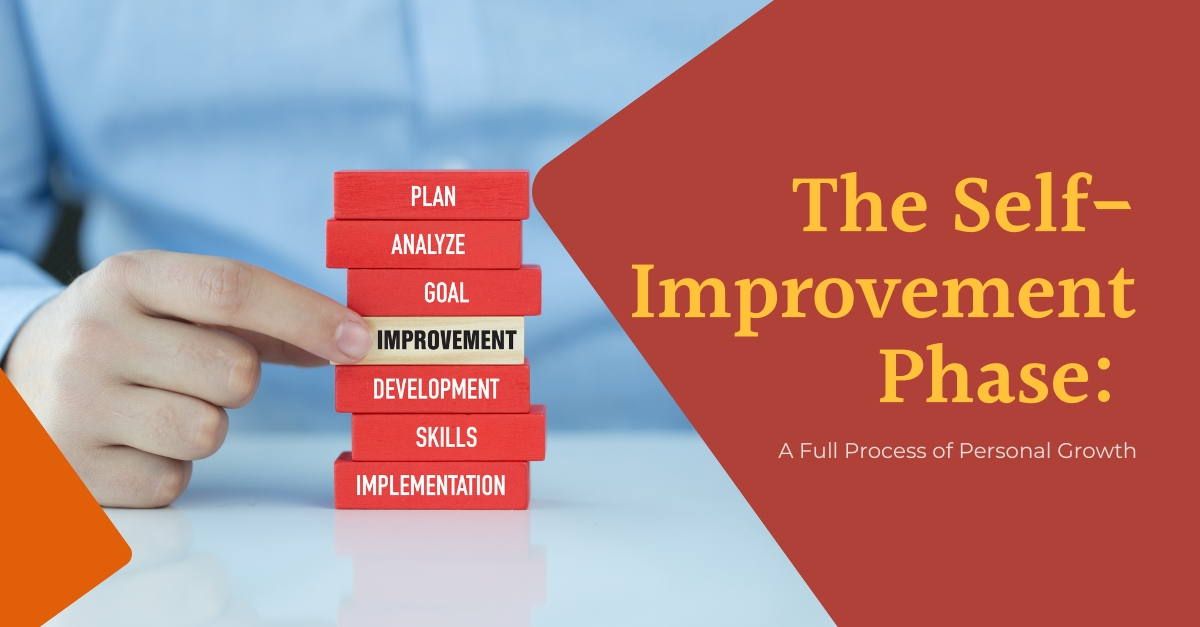The Self-Improvement Phase: It is a journey that shall take one through improvements pertaining to everything in life: from keeping mentally and emotionally fit to physically healthy and professionally enhanced. The process of self-improvement is transformative since it helps an individual grow, evolve, and reach their fullest potential. Whether to build positive habits, learn new skills, or develop a resilient mindset, self-improvement will play a crucial role in personal success.
Self-improvement holds its importance in enhancing self-awareness, increasing confidence, and creating fulfillment. Through constant betterment of one’s self, limitations can be overcome and opportunities availed, living life to the fullest. It makes one flexible and resilient to take up life’s challenges with optimism.
Key strategies for self-improvement involve setting clear goals, being self-disciplined, seeking continuous learning, and maintaining a growth mindset. Developing good habits promotes continued improvements-perhaps in reading, exercising, and mindfulness. Surrounding yourself with supportive and inspiring people accelerates your personal growth.
On the road to self-betterment, however, are pitfalls that need a dose of patience, consistency, and acceptance of change. There will be hitches, but one gets through them with perseverance and a bit of self-reflection. It is important to recognize that self-improvement is actually a gradual process; when this realization sets in, individuals will be more motivated and appreciative of their growth.
After all, self-improvement is a lifetime commitment toward becoming a better version of one’s self. Embracing this phase of transformation with dedication and an open mind can yield greater success, happiness, and personal fulfillment.
Why Self-Improvement Matters
- Improves Self-Awareness – To understand oneself well is to make informed decisions about one’s goals and aspirations.
- Gains Confidence – Continuous learning and improvement build self-esteem and confidence.
- Improves Mental and Physical Health: Meditation, physical training, goal-oriented actions, among other personal development practices, promote overall well-being.
- More Productive and Successful: Self-improvement provides an individual with the ability to be more disciplined, focused, and motivated toward achieving success.
- Better Relationships: Building emotional intelligence and effective communication skills pays dividends in personal and professional relationships.
Key Strategies for Self-Improvement – The Self-Improvement Phase
- Set Clear Goals
- Clearly define both short-term and long-term goals.
- Use SMART (Specific, Measurable, Achievable, Relevant, Time-bound) goals.
- Develop a Growth Mindset
- Embrace challenges; learn from failures.
- The progress, not perfection, is important.
- Healthy Habits
- Regular exercises and eating a balanced diet.
- Sleep and self-care routines are a priority.
- Read and Learn Continuously
- Invest in books, online courses, and skill development programs.
- Stay updated with industry trends and build knowledge.
- Mindfulness and Gratitude
- Meditate and reflect upon the self.
- Keep a gratitude journal to stay thankful for progress.
- Seek Constructive Feedback
- Be in the company of good mentors and people who will support you.
- Feedback is a godsend to grow on.
- Get Out of Your Comfort Zone
- Challenge yourself to try new things.
- travel, engage in different hobbies and study perspectives.
- Do Effective Time Management
- Help yourself prioritize tasks using time management techniques such as Pomodoro.
- Avoid procrastination by breaking down tasks into manageable steps.
- Have a Positive Social Network
- Mingle with like-minded people who facilitate improvement in you.
- Avoid toxic relationships and hence negativity.
The Challenges Self-Improvement Faces – The Self-Improvement Phase
Self-improvement is fulfilling; however, it has its setbacks. Learning how to identify and overcome them is important in maintaining progress and encouragement.
Fear of Failure
One of the major stumbling blocks in personal growth is the fear of failure. Many people do not make an attempt because of the fear of failure, especially mistakes. However, failure is never a backward move but learning opportunities. Every failure and mistake has valuable lessons that always add to success over time. Inclusion of failure as part of the journey provides the building blocks for resilience and confidence.
Lack of Motivation
It is easy to get motivated and fall off the bandwagon in between due to slow improvement. To beat this, one must set clear, achievable goals and reward oneself after achieving a milestone. It could be treating yourself after completing a task or tracking progress in a journal. These little things will keep you interested and concerned. Surround yourself with people who support and believe in you, which will eventually motivate you.
Time Constraints
The busy schedules keep us away from allotting any time for improvement. Growth need not necessarily demand huge chunks of time. Rather, small pieces fitted into life, such as 10-minute reading, 15-minute workouts, or practicing mindfulness before sleeping, will bring substantial difference when it sums up. Scheduling them just like any other day-to-day affairs keeps them ongoing in life.
Lack of Self-Confidence
Negative thoughts and self-doubt can also make a person not act in the way of self-improvement. It requires overcoming through changing of thought to positive one with affirmations and self-reflection. The daily affirmations, journaling, and reflection upon past successes will help to instill confidence. Personal growth is a journey and not a race; hence, one can always make good progress without putting pressure.
Is Self-Improvement a Never-Ending Process?
By understanding these hitches and acting in a way to surmount them, the process of self-improvement becomes easier to handle and productive. Is Self-Improvement a Never-Ending Process? While self-improvement requires a lifelong path, it always requires balance on the personal end to make such growth a very positive experience; it must, at no single time, boil down to stresses, burnouts, and dissatisfactions in life. Approaches toward self-improvement should be balanced by a very healthy mentality-the kind that mixes ambition with acceptance of oneself.
Trying to be better does not need one to always be at some unrealistic score. It’s essential to be very realistic about perfection being unattainable and that movement supersedes perfection any day. Setting realistic goals, managing expectations, and taking breaks whenever one needs to will sustain the long-term drive without burnout. Self-care and rest are as important as hard work in most self-improvement journeys.
Another critical feature of balanced self-improvement is to celebrate small victories. It gives confidence to your achievements and positive behavior reinforcement. Reflecting on how far you have come, rather than focusing only on how much further you have to go, helps maintain a feeling of fulfillment and motivation.
Besides, self-acceptance is the realization that growth does not have to mean a complete transformation of oneself. It means improving strengths, rising above limitations, and adopting a healthier perspective-but not necessarily changing into a wholly different person. Self-acceptance and self-appreciation, coupled with realistic goals, will ultimately make self-improvement a gratifying and continuing process.
Ultimately, the balanced approach to self-improvement leads to success and well-being in the long run. By acknowledging progress, practicing self-care, and keeping a positive outlook, individuals can grow without losing sight of their overall happiness and satisfaction.
Conclusion
The self-improvement phase is the transformational journey of personal fulfillment and success. One can unlock his or her full potential by following effective strategies, surmounting challenges, and keeping things in balance. After all, growth isn’t about perfection; it’s about becoming a better version of yourself with each day that passes.
Frequently Asked Questions – The Self-Improvement Phase
1. What is meant by self-improvement?
Self-improvement encompasses enhancement in the areas of life including, but not limited to, mental, emotional, physical, and professional development. It includes goal setting, changing habits for good, and lifelong learning directed toward becoming one’s best self.
2. Why is self-improvement important?
Self-improvement engenders confidence, raises self-awareness, and improves well-being. It will help an individual to learn how to surmount challenges, enhance skills, and live a more fulfilling life.
3. How can I get started on self-improvement?
Identify areas you want to improve, set achievable goals, and then make a plan. Now, focus on small and constant changes such as reading, exercising, practicing mindfulness, or learning new skills.
4. How to Stay Motivated in Self-Improvement?
One needs to clearly set goals, track the progress, celebrate small wins, and surround themselves with positivity. Moreover, developing self-discipline and keeping a growth mindset helps in all respects.
5. Can self-improvement lead to burnout?
Yes, working without rest to achieve self-improvement will only lead to burnout. It needs balance, like self-care, realistic goal setting, and acknowledgment of progress made personally.
6. How long does it take for self-improvement?
Self-improvement is a lifetime process. Few changes happen in the present time, but a few take their time. The focus should be on constant progress, not perfection.
7. Is self-acceptance an important aspect of self-improvement?
Of course, self-improvement should be about building on strengths and weakening one’s weaknesses, not creating an individual who is completely different. Self-love during the process of trying to improve brings about a situation of balance.
8. What are some good self-improvement habits?
Reading, exercise, gratefulness, goal setting, journaling, meditation, and learning continuously are excellent habits that will usher in self-improvement.
By following these insights effectively, you could get through this phase and grow long-term in your life by being satisfied with yourself.





